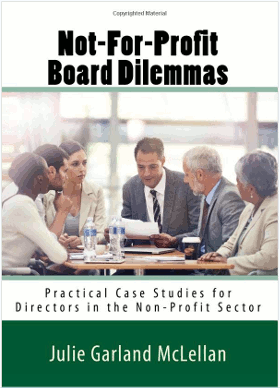Dear reader,
Welcome to the May 2018 edition of The Director’s Dilemma.
Please help me continue to increase the positive impact of this newsletter by forwarding a copy to a board colleague (or aspiring director) with a suggestion that they may wish to subscribe.
To read this email in a browser, go to www.mclellan.com.au/newsletter.html and click on 'read the latest issue'.
This month our case study protagonist risks being swept into a disaster that is not of her making. I hope you enjoy thinking about the governance and strategic implications of the latest dilemma:
 Zoe chairs a large government-owned company. She is proud of her board's skill. Board policy ensures directors receive governance training; Zoe has credibility with her portfolio department, and her opinion is sought about the skills required when director succession occurs.
Zoe chairs a large government-owned company. She is proud of her board's skill. Board policy ensures directors receive governance training; Zoe has credibility with her portfolio department, and her opinion is sought about the skills required when director succession occurs.
The last director appointment, however, has been a disaster.
She nominated skills her board needed, and public advertisements attracted well-qualified applicants. Two months after applications for appointment closed she heard that Cabinet had received a nomination and approved appointment of her board's new director. A few days later a daily newspaper published an article alleging that the successful applicant had not formally applied for the role and that her CV had been given to the Treasurer only days before the cabinet meeting. Other papers picked up the story and questioned motives for the appointment of this director to Zoe's board.
The Premier and portfolio Minister have both made public statements that cabinet process was followed, that the applicant's CV had been previously submitted to the government in application for other roles, and that the appointment has gone to a well-qualified individual.
The new director has called Zoe and asked for a coffee meeting to get to know each other (it is common for government board appointments to be made to directors whom the chair has not met). She apologised for the negative publicity and requested, as she has no board experience or training, that the company pay for her to attend an expensive residential company director's course before her first board meeting.
Zoe has set up a date for the coffee and is worried about the training. If the press discover that her controversial new director has been sent for training they will mock the announcements about the 'well-qualified' director appointment. If the new director doesn't receive training she may struggle to add value immediately, causing other directors and senior executives to lose respect for her, and Zoe will breach her board's own policy.
What can Zoe safely do?

 Dear Zoe,
Dear Zoe, Shareholders appoint directors. Zoe's job is to lead her board. Her situation is no different to that of any other chair who has recommended a director appointment and had shareholders make a different decision.
Shareholders appoint directors. Zoe's job is to lead her board. Her situation is no different to that of any other chair who has recommended a director appointment and had shareholders make a different decision. Zoe has to do the best job she can for the organisation with the board she is given by the Premier and portfolio Minister.
Zoe has to do the best job she can for the organisation with the board she is given by the Premier and portfolio Minister.


